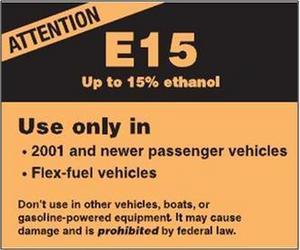Ethanol industry reorients discussion about E15 and boating



November 8, 2011
BY Holly Jessen
Recent talk about a study of the damage E15 can cause to marine engines missed the point, according to Kristy Moore, director of technical services for the Renewable Fuels Association. “A meaningful discussion would note that E15 is illegal for use in marine engines, that the testing being cited is not comprehensive and that the ethanol industry has repeatedly extended olive branches to work on the concerns boaters and others have raised,” she said.
The subject came up during a Nov. 2 U.S. House of Representatives Energy and Environment Subcommittee hearing on motor fuel standards. David Hilbert, a thermodynamic development engineer for Mercury Marine and a representative of the National Marine Manufacturers Association, testified about a U.S. DOE study of E15 and marine engines, the results of which were released in October. “This study showed how misfueling marine engines currently in use with E15 may cause a variety of issues for owners and can lead to premature engine failure,” Hilbert said during his testimony.
Advertisement
Advertisement
The testing compared the use of ethanol-free gasoline to E15 use in three outboard marine engines during 300 hours of wide-open throttle endurance testing. For modern engines, a 9.9 horsepower carbureted four-stroke engine and a 300 hp supercharged electronic fuel injected four-stroke engine were tested. For an example of a legacy engine still in use today, a 200 hp electronic fuel injected two-stroke engine was tested. “Despite the limited nature of this testing, several significant issues were identified,” Hilbert said. “In addition to the need for more 2-stroke lubrication system testing, more testing is needed to understand how E15 fuel affects marine engines during other operating conditions. Examples would include starting, acceleration/deceleration, part-throttle operation, and the effect of E15 fuel on marine engines that are stored with fuel in the system over long periods of time, which occurs regularly with our engines.”
At the hearing, Hilbert showed pictures of engine failures that occurred during testing as a means to incite fear, Moore said. The U.S. EPA fuel waiver for E15 covers light duty cars and trucks model year 2001 through the current year, not small engines. The EPA’s required label for fuel pumps that dispense E15 specifically says “don’t use in other vehicles, boats, or gasoline-powered equipment, it may cause damage and is prohibited by federal law.” “The RFA believes the EPA’s labeling and misfueling mitigation plans clearly presents the information consumers need to use E15 legally and appropriately,” Moore said. “We also believe that consumers are savvy enough to know what is right and what is wrong for their equipment.”
Advertisement
Advertisement
It’s ironic that it’s the small engine manufacturers that have been the loudest in opposition to E15, says Ron Lamberty, vice president and director of market development for the American Coalition for Ethanol. Those users only utilize about 1 percent of the fuel market and aren’t approved for E15 use anyway. “That’s maybe the ultimate stupidity of the test,” he said. Besides, the ethanol industry isn’t encouraging consumers to fill up their boats with E15 and risk engine failures. “That doesn’t help, that’s not the way to sell ethanol,” he said.
Consumers should continue to fuel up their boats with gasoline or E10, as is recommended on the website of Mercury Marine. “Fuels containing up to 10 percent ethanol are considered acceptable for use in Mercury engines,” the company said in its frequently asked questions section. Fuels with higher ethanol content than 10 percent, however, can void the warranty.
Moore further pointed out that marine engines are built to run on gasoline containing no ethanol. It’s really no big surprise, she said, that some abnormalities were found with the use of E15. What it does is highlight the need for up
Upcoming Events





